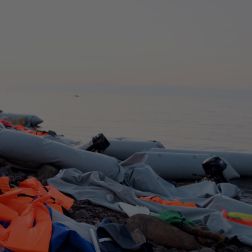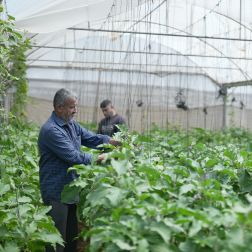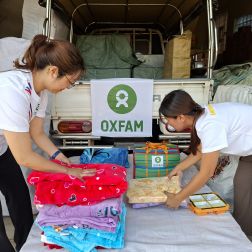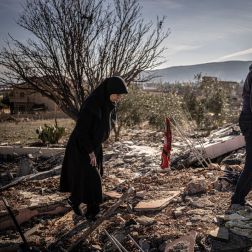- 6 mins read time
- Published: 18th March 2016
Musical chairs increases the tragedy for vulnerable people in Macedonia
As thousands of people continue arriving in Europe seeking safety and security, Ruth Tanner recently visited the Oxfam programme for people on the move in Macedonia.
Vulnerable people on the move, from Syria, Iraq, Afghanistan, and elsewhere are facing arbitrary profiling at borders on the basis of nationality. This pushback denies the right to an individual assessment of protection needs and constitutes a violation of international and EU law. Authorities have now closed their borders to all, creating a further humanitarian crisis.
Last week I visited the Tabanovce camp in Macedonia. The camp itself is not very big, given the number of people living there. It consists of two neat rows of white containers, and some larger tents, including a food tent feeding hundreds of people with hot soup as we arrive. The place is designed to be a rest stop for a few hours or a night before people continue their journey, but is now home to over a thousand people.
It has been wet every day for the past week and the damp and cold permeate everything. People are sleeping in the containers, a handful with bunkbeds and heating, home to families with lots of children. Most people are in containers with no heating. Three large tents, originally waiting rooms for those about to cross the border, are now makeshift homes, with benches rearranged to be turned into beds and a chaotic arrangement of mattresses and blankets.
There is also a large cabin for women and children. It has the feel of a nursery with children’s scribbled pictures on the wall. In the corner, a two-week-old baby sleeps peacefully in a crib, his mother lying next to him on a mattress on the floor. At the door two little boys negotiate with us for a ball to play with. “It’s raining, it’s late, rest tonight and I promise to bring you one tomorrow” offers my guide, a lawyer with Oxfam’s partner the Macedonian Young Lawyers Association, working hard to calm and offer advice to the people of the camp.
The camp is full or people who were turned away at the border due to their nationality or for not having papers filled in correctly. The team tell me about a woman from Syria, travelling with her three children. Her husband is waiting for them in Germany. They filled the forms in correctly, are from the country and a city which is on the list approved for transit, yet for some reason she and her children were refused entry. The lawyer doesn’t understand why, so she can’t give the family any answers.
Cases like hers are typical. Over the past few weeks, more and more restrictive and discriminatory rules have been introduced. First, everyone who was registered could travel, then only Syrians, Iraqis and Afghans, then suddenly only Syrians, but only from certain cities who declared the right destination country. At the borders there are translators whose job it is to determine accents and even ask questions like, “Do you know this restaurant, this shop, are you really from the town you say you’re from?” Arbitrary rules are turned into even more arbitrary decisions by border guards and translators; now even these rules and regulations have ceased to matter, as the borders are closed to everyone.
The border was closed on Monday lunchtime, an hour or so before over 400 Syrians arrived. They had been told they were crossing to Serbia, their papers were approved and they were moved past the camp, a hundred yards up a dirt track to the fields between the two countries. In this game of musical chairs, they were unlucky – the Serbian police refused them entry, and the Macedonian police wouldn’t let them back.
The night they arrived, Oxfam staff along with others from the camp and the police, battled the wind and torrential rain to put up some tents to provide shelter in the dark field for the hundreds of people, mainly women and children, who were now stuck.
When I arrived, 48 hours later, this no man’s land is a sea of mud. A young man comes to talk to us. “Can you help?” he asked our translator. “My baby’s sick.” He went to fetch his wife and baby from a tiny tent nearby. The worried-looking parents held the baby close as they waited in the dark for help to come from the camp. They are not able to walk the 100 yards back to the camp for help, they must wait for it to come to them.
Back at the Tabanovce camp, I notice two young men with rucksacks and rolled up sleeping bags on their backs. For some, like them, the wait and the not knowing is too much. Every night there are fewer people in the camp than the night before. Vulnerable and invisible, with borders closed and hope fading, they’d rather take their chances with the smugglers than risk being sent back.
Border closures, coupled with a stark lack of legal routes, are not the answer to managing the arrival of refugees and migrants in Europe. People, not borders, are in urgent need of protection. Oxfam is calling on governments to end the series of discriminatory and dangerous measures adopted by European countries to deter vulnerable people from seeking safety. Instead they must take action to ensure that the immediate humanitarian needs of people on the move are met, and to live up to their obligations under international law.
Ruth Tanner is Oxfam’s Advocacy Advisor in South East Europe.
Giovanni Riccardi Candiani, Senior Humanitarian Programme Advisor with Oxfam, with an update from Lesbos, Greece, on the refugee crisis, the EU Turkey Deal and how Oxfam is responding.




